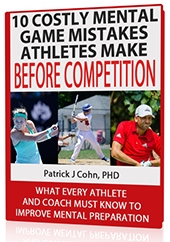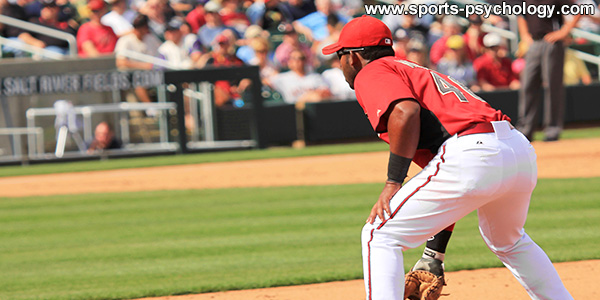Turning Athletic Failure Into Growth
Summary: How an athlete responds to failure shapes future performance. Viewing mistakes as learning opportunities and focusing on improvement allows setbacks to fuel growth rather than discourage effort. Studying successful athletes and modeling their techniques helps refine skills. A positive mindset toward failure turns past losses into motivation for long-term success.
How do you respond to losing or failure?
What sort of emotions does failure evoke within you?
How have you recovered from failure in the past?
Your perspective on failure affects your thoughts and impacts your emotion.
These three components, perspective, thoughts and emotions, will determine how you respond to failure.
Many Athletes View Failure as the Worst thing Possible in Sports
After all, you compete in sports to win and to play your best every single time you play.
You spend hours upon hours honing skills, working hard in practices, and doing everything possible to up your game.
Failure makes all your effort seem not worth it.
You might think, “Why should I continue to work hard when it never seems to pay off?”
Making mistakes in a competition may magnify the emotional component for some athletes.
Anger, frustration, hopelessness, sadness and resignation in the middle of the competition will just take you out of game and probably result in giving less than your best effort.
Mistakes can Turn into Successes With the Right Approach
That’s exactly how Boston Red Sox outfielder J.D. Martinez became a successful outfielder in the Major Leagues.
Martinez played his first three seasons in Houston and only managed to hit .251 in 252 games.
In 2013, Martinez was told by his hitting coach that he didn’t have the proper swing to become an impact hitter in the major leagues.
Imagine not performing well in your sport and having a coach severely criticize you on top of that.
Those circumstances could have turned a perceived failure into disaster… But not for Martinez.
Martinez had a mindset focused on improvement rather than his misses in the past.
Martinez responded by watching film of successful hitters, studying the elite hitters of the game and modeling the mechanics of top hitters to eventually become one of the top consistent hitters in the league.
In his next six out of seven seasons, Martinez has hit over .300 and has become a key component in the Boston Red Sox’s run for the 2018 MLB Championship.
Martinez talked about his experiences in Houston and how he was able to develop a positive mindset and turn his misses into successes.
MARTINEZ: “What stands out to me? I think the growing pains, really. I learned how to fail, if that’s something. I think I went through all my failure there and I kind of learned and I grew. And I knew kind of what worked, what didn’t work.”
The misses you have gone through in your athletic career, or what some would call failure, do not need to stop you from reaching your goals.
In fact, past losses or failure can fuel you and lead you to successes by motivating you to work harder or smarter…
What doesn’t work helps you learn how to change your approach to push you forward in your career…
But it all depends on your mindset and your attitude towards failure.
Turning Failure Into Growth:
After every competition, consider the following questions:
- What is working for you? What did you do well?
- What do you need to improve in your mental game?
- What can your improve technically or tactically?
- What did you learn that will make you a stronger athlete or better team?
Look to make small modifications rather than major overhauls, especially if you are in the middle of your season.
Use past performances to grow and learn. Avoid doubting your skills. You’ll always have ups and downs in your career. Does Tiger Woods come to mind?
1. Reframe Failure as a Learning Opportunity
View mistakes and losses as chances to improve. Analyze what didn’t work and use that insight to adjust your approach for future success.
2. Study and Model Successful Athletes
Observe top performers in your sport and learn from their techniques, strategies, and mindset. Apply those lessons to develop your own skills and consistency.
3. Focus on Improvement, Not Past Results
Shift your mindset from dwelling on past failures to taking proactive steps toward growth. Consistent effort and a positive attitude turn setbacks into long-term success.
Related Sports Psychology Articles:
- Fear of Failure and Mental Toughness in Sports
- How to Develop Growth Mindset
- Taking Responsibility to Turn Your Game Around
Free Mental Toughness Reports

Get instant access to a mental game report to improve your mental toughness. Are you making one or more of these “deadly” mental game mistakes prior to competition? You can improve your mental game with one of our free sports-specific reports below.
with our free mental toughness reports, you’ll:
- Discover if you have positive or negative pregame jitters.
- Identify your pre-competition mental game mistakes.
- Learn the important pregame mental skills to boost your performance and success!
Learn how mental game strategies can boost your mental toughness in sports with Dr. Cohn’s free mental game reports!
FAQ: Turn Mistakes Into Success
Q: How should athletes view failure?
A: Athletes should see failure as a learning opportunity. Mistakes provide insight into what needs improvement and how to adjust for future success.
Q: Can past failures help improve performance?
A: Yes. Reflecting on past losses or mistakes can motivate athletes to work harder, refine skills, and develop smarter strategies.
Q: How did J.D. Martinez turn early struggles into success?
A: Martinez studied successful hitters, analyzed his own performance, and focused on improving his swing and mindset, eventually becoming a consistent top hitter.
Q: Why is mindset important after failure?
A: A positive mindset allows athletes to focus on improvement rather than dwelling on past mistakes, helping them turn setbacks into long-term growth.
Q: How can athletes apply lessons from top performers?
A: By observing elite athletes’ techniques, strategies, and approach to competition, athletes can model these habits to enhance their own performance.
Q: What role does attitude play in overcoming failure?
A: Attitude determines whether failure discourages effort or motivates growth. Maintaining a proactive, positive outlook is essential for turning setbacks into success.
Dr. Patrick Cohn is an expert mental performance coach who has helped athletes for over 30 years enhance their performance. Dr. Cohn earned a master’s degree in sports psychology from CSUF and a Ph.D. from the University of Virginia, specializing in Applied Sports Psychology.

